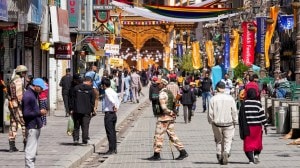Musharraf wants Kashmir issue resolved through dialogue
ISLAMABAD, MAY 28: Marking the second anniversary of Pakistan's nuclear tests, Chief Executive Gen Pervez Musharraf on Sunday said his cou...

ISLAMABAD, MAY 28: Marking the second anniversary of Pakistan’s nuclear tests, Chief Executive Gen Pervez Musharraf on Sunday said his country wants resolution of the Kashmir problem through dialogue but Islamabad’s offer for talks should not be taken as a "sign of weakness".
At the same time, Russia and the United States have asked Pakistan to create a "positive" atmosphere for resumption of "fruitful" dialogue with India and take "effective steps" to counter the linkage of terrorist groups active in the country with the "international terrorist network".
Addressing scientists, agriculture experts, scholars and students of science and technology, Musharraf said, "Pakistan wants to remove the main cause of tension in South Asia by resolving the Kashmir dispute in an equitable manner through peaceful dialogue. But the desire to have dialogue with India should not be construed as its (Pakistan’s) weakness."
Claiming Pakistan did not want to enter into an arms race with India, Musharraf said, "Pakistan has offered India a nuclear-restraint regime but did not get a positive response to its offer."
Reiterating the need for a minimum credible nucleardeterrence, he said the nuclear tests by Pakistan in May 1998 were "in supreme national interest." Musharraf said the last two years had, however, shown that nuclear capability cannot ensure economic emancipation of a nation.
Pakistan possessed the nuclear know-how to declare itself a nuclear power 10 years ago, but refrained from doing so "in respect of international norms," said Musharraf. "But then India tested and they followed it with hostile threats. We were forced to conduct our tests to restore the strategic balance in the area," he said.
Meanwhile, in a joint statement issued at the end of bilateral consulations on South Asia, held last week in Moscow, US Assistant Secretary of State Karl Inderfurth and Russian Deputy Foreign Minister Alexander Losyukov noted the "decisive importance" of the resumption of constructive dialogue between New Delhi and Islamabad.
Russia and the United States have asked Pakistan to create a "positive" atmosphere for resumption of "fruitful" dialogue with India and take "effective steps" to counter the linkage of terrorist groups active in the country with the "international terrorist network".
Restraint, rejection of violence and respect for the Line of Control in Kashmir were the "integral elements" of this process, they said and hailed the recent release of Hurriyat leaders by India.
US and Russia expressed concern at the "growing influence" of extremist groups in Pakistan and asked Islamabad to take "effective steps" to counter the linkage of these groups with the "international terrorist network" which has contributed to regional instability and "internal lawlessness". They also called for "speedy" restoration of civilian democratic rule in Pakistan.
Inderfurth and Losyukov also called for signing of the CTBT and NPT by both New Delhi and Islamabad and noted the ‘positive’ significance of moratorium on nuclear tests in South Asia.



- 01
- 02
- 03
- 04
- 05



























